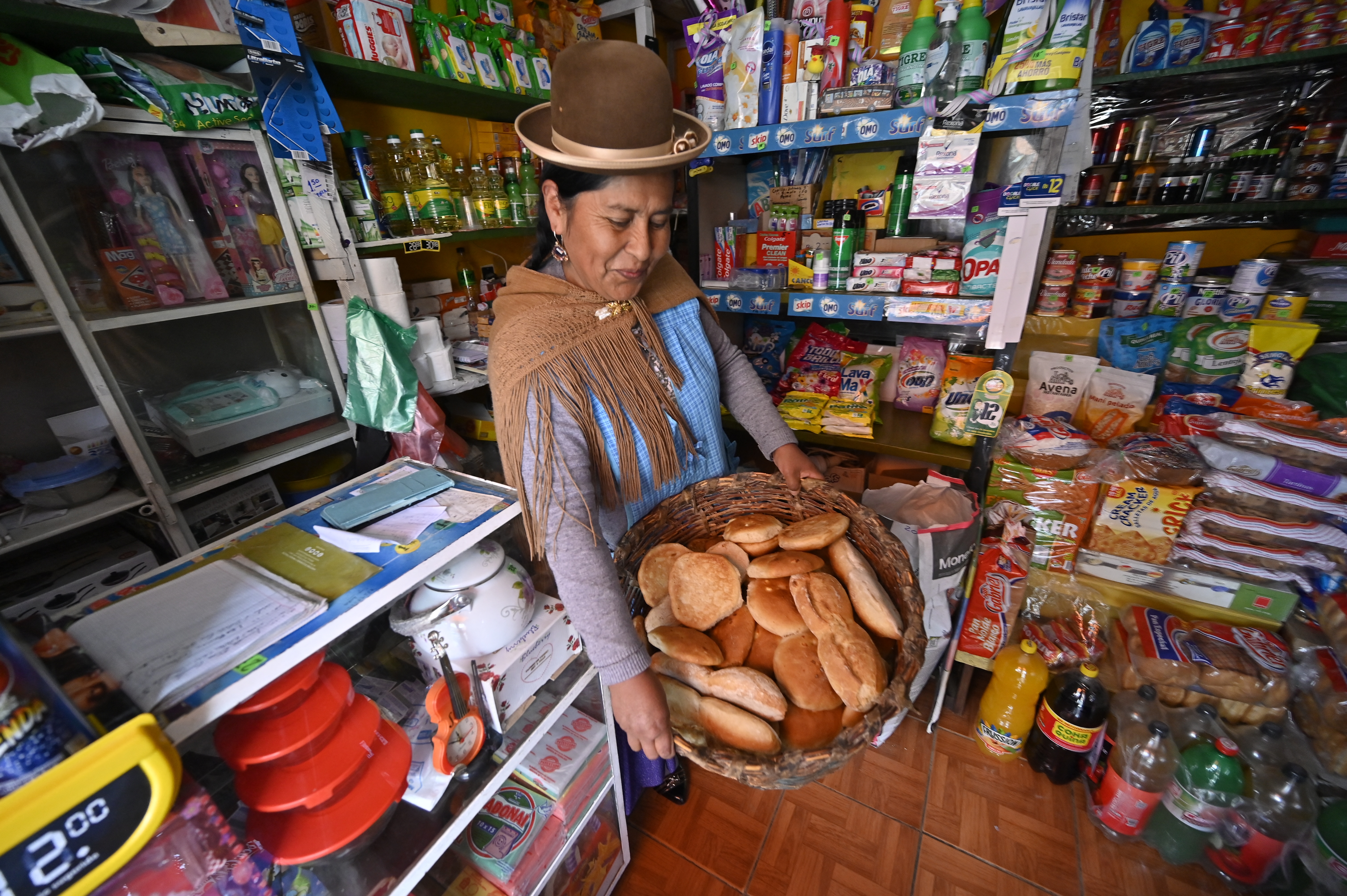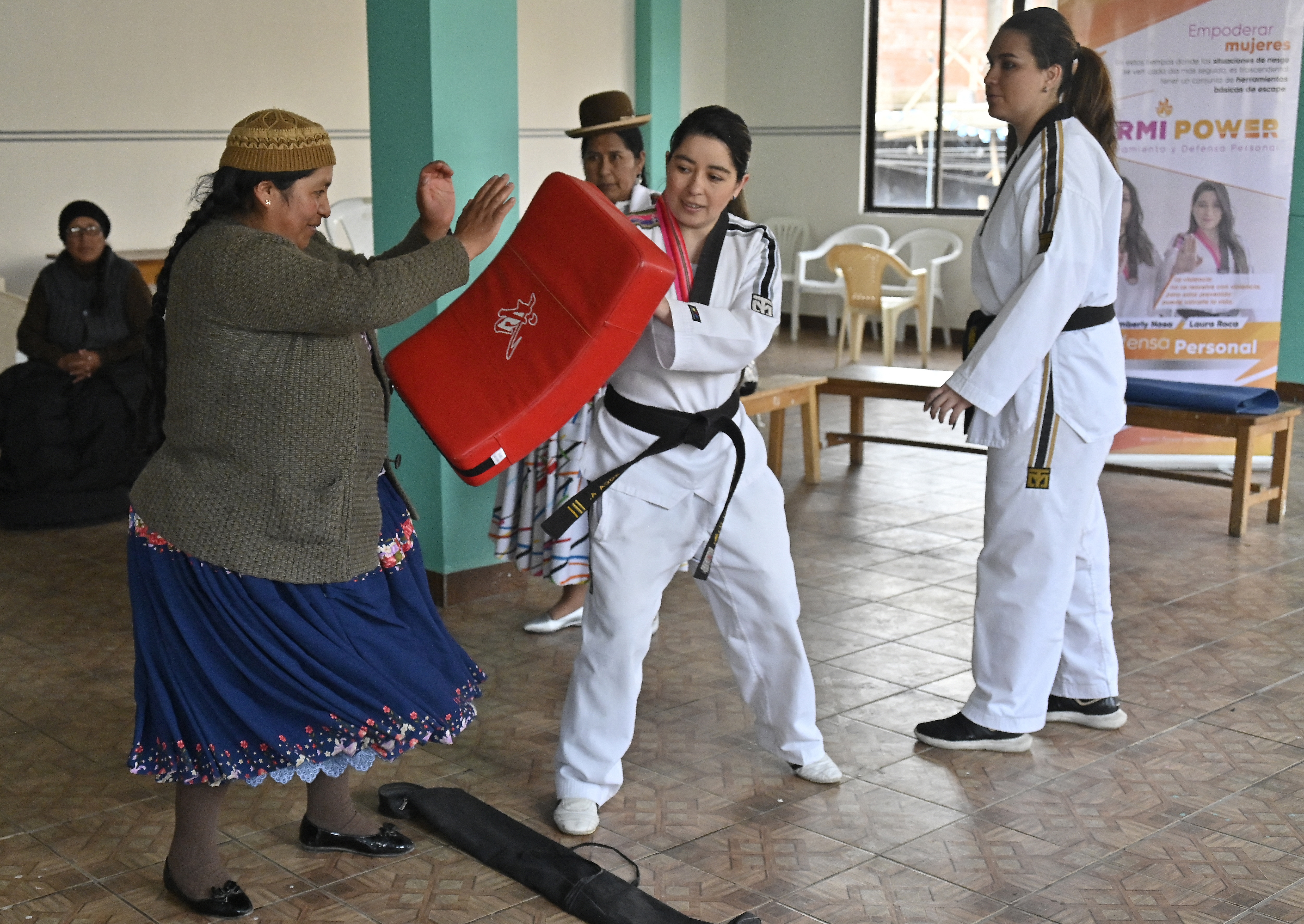Women's Rights & Issues
Related: About this forumIndigenous Bolivian women take up taekwondo against gender-based violence
Indigenous Bolivian women take up taekwondo against gender-based violence
Bolivia has one of the highest rates of gender violence, with 80 percent women experiencing it in their lifetime.
 ?resize=1170%2C780&quality=80
?resize=1170%2C780&quality=80
Many dressed in traditional Aymara bulging skirt with woollen blanket and tall bowler hat over two long braids, the women start each session with a muscle warm-up. [Aizar Raldes/AFP]
Published On 6 Mar 20246 Mar 2024
A violent attack by would-be robbers steered Bolivian Lidia Mayta towards the martial art of taekwondo. Three years later, she helps train other Indigenous women to defend themselves against rampant gender-based violence in the South American country. Mayta says she would have died if neighbours had not come out of their homes to scare off the assailants choking her outside her front door as they tried to steal her wallet. After the attack, she pledged she would never feel so helpless again. She joined a woman-only class at the Warmi Power taekwondo studio in Bolivia’s second city El Alto. Warmi means “woman” in the indigenous Quechua language. Her enthusiasm was such that the founders soon asked her to join the training team, helping in particular to translate instructions into Aymara, another of Bolivia’s indigenous tongues. “I didn’t know how to defend myself, now I try to help other women lose that fear,” the 56-year-old shopkeeper and community health secretary said. “This is a job of violence prevention.”
Government data shows that eight out of 10 women and girls in Bolivia suffer physical violence at least once in their lives. “This is a violent country for women,” said Lucia Vargas of Coordinadora de la Mujer, or Women’s Coordinator, a rights advocacy group. In 2023, more than 51,000 women reported falling victim to violence. Husbands or partners were the perpetrators in the vast majority of cases.
Warmi Power was launched by Laura Roca and Kimberly Nosa – both taekwondo black belts – in 2015. “Violence is not solved with violence, but learning to defend ourselves can save our lives,” said Nosa, who has been practising the martial art for 18 years. Roca is a trained psychologist who said she took up the discipline despite her father insisting it was the preserve of men. Together, the pair have trained more than 35,000 women countrywide. At the class in El Alto, most of the women are Indigenous and engaged in informal trade.
 ?fit=1170%2C778&quality=80
?fit=1170%2C778&quality=80
Lidia Mayta, taekwondo instructor, works at her business in El Alto. [Aizar Raldes/AFP]
 ?fit=1170%2C800&quality=80
?fit=1170%2C800&quality=80
Most women have never dealt a blow in their lives and seem uncertain with their first air punches. [Aizar Raldes/AFP]
 ?fit=1170%2C780&quality=80
?fit=1170%2C780&quality=80
But they soon get into the routine. They kick, they scream, and they learn to identify an assailant's weak spots. [Aizar Raldes/AFP]
 ?fit=1170%2C767&quality=80
?fit=1170%2C767&quality=80
Women's rights groups in Bolivia say gender-based violence is normalised in a society where many men see women as property. [Aizar Raldes/AFP]
 ?fit=1170%2C780&quality=80
?fit=1170%2C780&quality=80
Since 2013, Bolivia has had a specific law to protect women from gender-based violence. It prescribed a 30-year prison term for the crime of "femicide" - when a woman is killed for being a woman. [Aizar Raldes/AFP]
 ?fit=1170%2C780&quality=80
?fit=1170%2C780&quality=80
But since the law entered into force, 1,085 femicides have been reported, and critics say not enough resources are dedicated to fighting gender-based crime in Bolivia. [Aizar Raldes/AFP]
 ?fit=1170%2C829&quality=80
?fit=1170%2C829&quality=80
An Aymara Indigenous woman practises with taekwondo instructors Laura Roca (C) and Kimberly Nosa (R) during the personal self-defence and therapy workshop called Warmi Power to prevent sexist violence in El Alto. [Aizar Raldes/AFP]
 ?fit=1170%2C780&quality=80
?fit=1170%2C780&quality=80
Taekwondo instructor Lidia Mayta gives a lecture before the self-defence and therapy workshop. [Aizar Raldes/AFP]
 ?fit=1170%2C780&quality=80
?fit=1170%2C780&quality=80
At the end of their class in El Alto, the taekwondo pupils walk one by one through a tunnel formed by two rows of women holding hands. "You're beautiful, you're powerful, you're valuable, you're a warrior, you're strong," they are told, and slapped on the back encouragingly. The class ends with a group hug. [Aizar Raldes/AFP]
https://www.aljazeera.com/gallery/2024/3/6/indigenous-bolivian-women-take-up-taekwondo-against-gender-based-violence